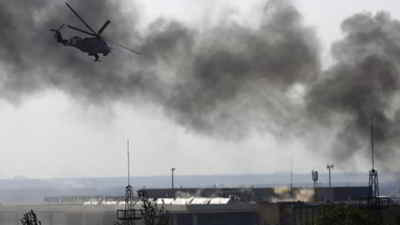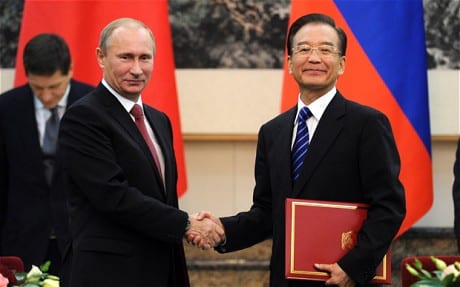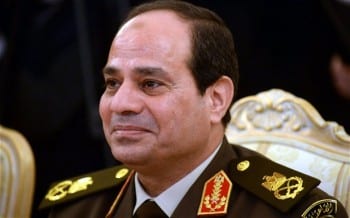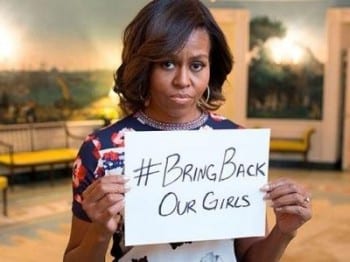The bloodbath in Donetsk
By Thomas Gaist and Barry Grey. Originally published by WSWS.

[Fires at Donesk airport courtesy RT]
This week’s mass killings in Donetsk have further exploded efforts to portray February’s Western-orchestrated putsch in Ukraine as a “democratic revolution” and exposed the brutal and reactionary character of Washington’s puppet regime in Kiev.
They have provided a devastating demonstration of the reality of “human rights” imperialism and an indictment of all the political forces that have lined up behind it, first in the Balkans, then in Libya and Syria, and now in Ukraine.
The Obama administration in Washington and the Merkel government in Berlin both congratulated the newly elected president, billionaire oligarch Petro Poroshenko, even as he was overseeing the bloodbath in the east. Obama and Merkel signaled their support for the mass killing, portraying it as a means of stabilizing and unifying the country.
Within hours of Sunday’s fraudulent and undemocratic election, a devastating air assault was launched against targets in Donetsk. At least 50 militants were killed and another 31 injured as Kiev regime aircraft strafed separatist positions in and around the Donetsk airport. Speaking on behalf of the self-proclaimed Donetsk People’s Republic, Leonid Baranov said the death toll will likely rise above 100.
As of Tuesday night, regime forces were preparing to follow the assault on Donetsk’s airport with an invasion of the city center. Civilians have reportedly been fleeing Donetsk en masse as gunfire and explosions continued to be heard from areas near the airport.
It is now clear that the election was organized to establish a political basis for the military onslaught in the east. The poll was carried out to provide a fig leaf of legitimacy to a regime installed illegally by means of a coup led by neo-fascist forces in the Svoboda Party and Right Sector militia.
In fact, the election exposed the government’s extremely narrow base of popular support. There was a near-total boycott in the Russian-speaking industrial heartland in the east and widespread abstention in the south of the country. The leaders of Svoboda and the Right Sector received negligible votes.
The bloodletting in Donetsk and mounting attacks in Luhansk and other rebellious areas are aimed not only at crushing a regional insurgency, but at terrorizing the population as a whole. At the urging of Washington’s CIA and military personnel in Kiev, the regime is seeking to intimidate anyone, in the west as well as the east of Ukraine, who opposes its IMF-dictated policies of austerity, privatization and unlimited plundering by Western banks and corporations.
This economic scorched earth program is to be accompanied by the transformation of Ukraine into an advanced staging area for US-NATO military operations against Russia.
President Obama called Poroshenko Tuesday to congratulate him on his victory and assure him of US backing for his drive to “unify and move his country forward.” Obama announced plans to meet with Poroshenko for talks in early June.
German Chancellor Angela Merkel telephoned Poroshenko to praise the “clear commitment of the Ukrainian people to unity and democracy as well as a peaceful solution to the current conflict.”
The official statement released by the Obama administration made clear that rapid implementation of the West’s economic agenda will be the basis of Ukraine’s “unity.” The statement stressed “the importance of quickly implementing the reforms necessary for Ukraine to bring the country together and to develop a sustainable economy, attractive investment climate, and transparent and accountable government…”
For his part, Poroshenko vowed Sunday to foster “a very good investment climate” and do “all the necessary things to attract business.” “All the necessary things” evidently includes the killing of thousands of people. Speaking Tuesday, Ukraine’s deputy prime minister, Vitaly Yarema, said that the “anti-terrorist operation” in the east will continue “until all the militants are annihilated.”
The events in Donetsk throw into sharp relief the boundless hypocrisy and cynicism of the imperialist powers, beginning with Washington. The contradictions in the official propaganda narrative justifying the right-wing coup in Ukraine could not be more glaring. That does not, however, prevent the media from simply ignoring them.
Barely three months ago, the Obama administration, echoed by Merkel in Germany, Hollande in France, Cameron in the UK, and the entire leadership of the European Union and NATO, were insisting that then-President Viktor Yanukovych had forfeited his right to rule, despite having been elected, because he mobilized riot police against armed anti-government demonstrators in Kiev.
Now, the same forces are endorsing the decision of Poroshenko to use fighter jets, attack helicopters, tanks and elite troops against protesters in the east.
In 2011, the US and its European allies cited the supposed threat of an attack by the regime of Muammar Gaddafi on the rebellious province of Benghazi in Libya’s east as justification for imposing a “no fly zone,” which immediately became the cover for an air war that killed tens of thousands of Libyans and ended with the torture and lynching of Gaddafi.
The following year, the use of force by Syrian President Bashar al-Assad against armed oppositionists was used as the justification for funding and arming Islamist militias and inciting a full-scale civil war that has killed an estimated 150,000 people.
When it suits their economic and geopolitical interests, however, as in Ukraine and other countries, including Egypt, the imperialist powers drop their pose of outrage over leaders who “kill their own people” as well as their “duty to protect” civilians.
The response of Russian President Vladimir Putin has been to abandon the anti-regime protestors to their fate, declaring his eagerness to find a modus vivendi with Poroshenko as part of a broader compromise with the US and the European powers. As the representative of the Russian oligarchs who obtained their fortunes by stealing the formerly nationalized Soviet property during the breakup of the USSR and restoration of capitalism, Putin fears the prospect of the unrest in Ukraine sparking a movement of Russian workers more than he fears the machinations of the US and Germany.
Only the unified struggle of Russian and Ukrainian workers against the ruling elites of both countries, as part of a broader struggle of European and American workers against imperialism, can halt the drive to war, dictatorship and mass poverty.




